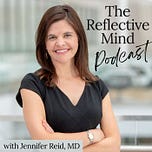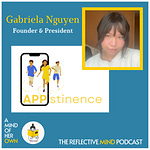In this eye-opening episode of the Reflective Mind Podcast, host Dr. Jennifer Reid sits down with two leading researchers who've uncovered a troubling trend in the messages women are receiving about confidence. Dr. Shani Orgad (London School of Economics) and Dr. Rosalind Gill (Goldsmiths University) discuss their recent book, Confidence Culture, and reveal how our culture's constant messaging to women about building confidence—from beauty brands hiring "confidence ambassadors" to workplace programs promising empowerment—may actually be making things worse.
As Dr. Orgad explains, "Confidence culture really encourages women to see themselves as held back by a lack of self-confidence rather than by structural inequalities, by barriers that are social, cultural and by social injustices."
What You'll Discover:
Why the proliferation of "love yourself" and "believe in yourself" messages represents both a culture and a cult
How confidence imperatives shift blame from structural inequalities to individual women
The stark differences between confidence messaging aimed at men versus women
Why vulnerability culture on platforms like LinkedIn creates new pressures for women
What a "climate of confidence" could look like as an alternative
The Research: The authors analyzed hundreds of texts, advertisements, workplace guides, and social media campaigns to document how confidence messaging has become ubiquitous—and problematic. Their findings show that while men receive confidence coaching focused on "mastery" and "performance," women are told to work on deep psychological transformation, often framed as "acts of self-love."
Why This Matters
This conversation offers a crucial reframe for anyone who's ever felt that despite all the "empowerment" messaging around them, something still feels off. Whether you're a woman navigating workplace dynamics, a parent concerned about messages your children receive, or simply someone interested in understanding how cultural narratives shape our lives, this episode provides both validation and a path forward.
The answer isn't more confidence coaching—it's changing the conditions that undermine confidence in the first place.
Key Quotes
On the Paradox of Confidence Culture:
"Precisely at the time where precarity and inequality are really rife and on the rise... when women are being disproportionately affected and injured by all these societal ills and structural inequalities, at that very same time, they're encouraged to harness somehow their individual resources to survive with grit, with resilience, with confidence."
— Dr. Shani Orgad
On the Core Problem:
"Confidence culture encourages women to fix themselves rather than to fix the world."
— Dr. Shani Orgad
On Gender Differences:
"For men, working on becoming confident was framed as a concerted effort and often kind of a short-lived... confidence project complete. By contrast, for women, working on the self is often presented as an ongoing project... it's a never-ending, bottomless pit project."
— Dr. Shani Orgad
On Moving Forward:
"We don't think about this as just a personal responsibility to overcome, but we actually see it as socially produced, culturally produced, affecting us all... and we put our energy into working towards a society where everyone can feel confident."
— Dr. Rosalind Gill
About the Guests
Dr. Shani Orgad is Professor of Media and Communications at the London School of Economics and Political Science. She's the author of five books, including Heading Home: Motherhood, Work, and the Failed Promise of Equality.
Dr. Rosalind Gill is Professor of Social and Cultural Analysis at Goldsmiths University of London. Her recent works include Gender in the Media, Mediated Intimacy, and Perfect: Feeling Judged on Social Media.
Together, they co-authored Confidence Culture, a groundbreaking analysis of how modern society's confidence imperatives impact women and perpetuate inequality.
Dr. Reid on Instagram: @jenreidmd and LinkedIn
Also check out Dr. Reid's regular contributions to Psychology Today: Think Like a Shrink.
Seeking a mental health provider? Try Psychology Today
National Suicide Prevention Lifeline: 1-800-273-8255
Dial 988 for mental health crisis support
SAMHSA's National Helpline - 1-800-662-HELP (4357)
-a free, confidential, 24/7, 365-day-a-year treatment referral and information service (in English and Spanish) for individuals and families facing mental and/or substance use disorders.
Disclaimer:
The views expressed on this podcast reflect those of the host and guests, and are not associated with any organization or academic site.
The information and other content provided on this podcast or in any linked materials, are not intended and should not be construed as medical advice, nor is the information a substitute for professional medical expertise or treatment. All content, including text, graphics, images and information, contained on or available through this website is for general information purposes only.
If you or any other person has a medical concern, you should consult with your health care provider or seek other professional medical treatment. Never disregard professional medical advice or delay in seeking it because of something that have read on this website, blog or in any linked materials. If you think you may have a medical emergency, call your doctor or emergency services (911) immediately. You can also access the National Suicide Help Line at 1-800-273-8255 or call 988 for mental health emergencies.














Share this post